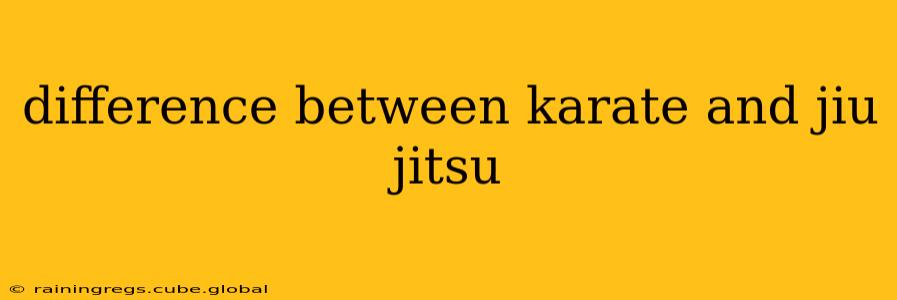Karate vs. Jiu-Jitsu: Unveiling the Differences Between Two Martial Arts Powerhouses
Karate and Jiu-Jitsu, while both ancient martial arts with rich histories, differ significantly in their philosophies, techniques, and overall goals. Understanding these differences is crucial for anyone considering learning either discipline. This deep dive will explore the key distinctions, answering common questions many martial arts enthusiasts have.
What is the main difference between Karate and Jiu-Jitsu?
The most fundamental difference lies in their primary focus: Karate emphasizes striking techniques, utilizing punches, kicks, blocks, and open-hand strikes, while Jiu-Jitsu focuses on grappling and ground fighting, employing submissions, joint locks, and chokeholds. Karate aims to defeat an opponent from a distance or through powerful, direct strikes, whereas Jiu-Jitsu excels in close-quarters combat and controlling an opponent's body.
What are the key techniques used in each martial art?
Karate: Employs a diverse range of linear striking techniques, emphasizing speed, power, and precision. Kata (forms) are integral to Karate training, developing balance, coordination, and precise movements. Common techniques include punches (like straight punches, hooks, and uppercuts), kicks (front kicks, side kicks, roundhouse kicks), and blocks. Different styles of Karate, such as Shotokan, Goju-ryu, and Kyokushin, each have their own unique variations and emphases.
Jiu-Jitsu: Relies heavily on grappling, takedowns, and ground fighting. Techniques involve controlling an opponent's body through grips, joint manipulation, and leverage. Submissions, such as arm bars, leg locks, and chokes, are used to force a tap-out or surrender. Jiu-Jitsu also incorporates sweeps and reversals, enabling practitioners to gain advantageous positions. Brazilian Jiu-Jitsu (BJJ), a widely popular form, emphasizes ground fighting and submissions.
Which martial art is better for self-defense?
The "better" martial art for self-defense depends entirely on individual preferences, body type, and the specific self-defense situation. Karate's striking techniques are effective at a distance, providing a way to create space and deliver powerful blows. However, if the fight goes to the ground, Jiu-Jitsu's grappling expertise becomes invaluable, allowing for control and submission holds even against a larger or stronger opponent. Ideally, a well-rounded self-defense system incorporates elements of both striking and grappling.
Is one martial art more effective in a street fight than the other?
The effectiveness of any martial art in a street fight is heavily influenced by factors beyond technique. These include the practitioner's skill level, experience, fitness, mental fortitude, and the specific circumstances of the encounter (multiple attackers, weapons involved, etc.). While both Karate and Jiu-Jitsu can be effective in a street fight, neither guarantees victory. Street fighting is inherently chaotic and unpredictable, rendering any martial art's effectiveness situational.
What are the physical and mental benefits of each martial art?
Both Karate and Jiu-Jitsu offer numerous physical and mental benefits:
Karate: Improves cardiovascular health, builds strength and flexibility, enhances coordination and balance, and cultivates discipline and focus.
Jiu-Jitsu: Boosts strength and endurance, improves flexibility and joint mobility, increases problem-solving skills, and develops confidence and mental toughness.
Which martial art is right for me?
Choosing between Karate and Jiu-Jitsu depends on your personal goals and preferences. Consider what aspects of martial arts appeal to you most: Do you prefer striking from a distance, or close-quarters grappling? Do you want to develop powerful strikes, or learn to control an opponent's body? Visit different schools, try introductory classes, and talk to instructors to determine which art best aligns with your interests and learning style. The best martial art is the one you enjoy and consistently practice.
